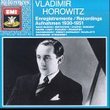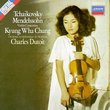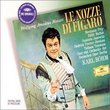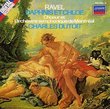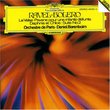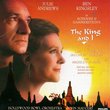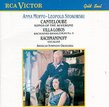| All Artists: Apollo's Fire Title: Praetorius: Christmas Vespers Members Wishing: 2 Total Copies: 0 Label: Koch Records Original Release Date: 1/1/2006 Re-Release Date: 10/9/2007 Genres: Dance & Electronic, Special Interest, Pop, Classical Styles: Holiday & Wedding, Vocal Pop, Opera & Classical Vocal, Sacred & Religious Number of Discs: 1 SwapaCD Credits: 1 UPC: 099923767329 |
Search - Apollo's Fire :: Praetorius: Christmas Vespers
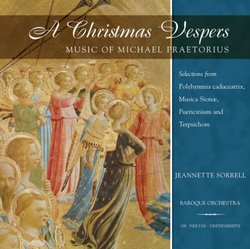 | Apollo's Fire Praetorius: Christmas Vespers Genres: Dance & Electronic, Special Interest, Pop, Classical
|
Larger Image |
CD DetailsSimilarly Requested CDs
|
CD ReviewsSui generis Giordano Bruno | Wherever I am, I am. | 05/14/2008 (5 out of 5 stars) "Michael Praetorius was an odd provincial genius, a prolific and inventive composer and musical theorist who lived nearly his whole life embedded in his musical/pastoral duties to his Lutheran congregation in Wolfenbuettel, in rural eastern Germany. That his music has survived at all, and that his theoretical writings have become a major source of historical information about music at the beginning of the 17th Century, is something of a fluke, the result of his self-publication and thus of the dissemination of music that followed from the developmrnt of printing. Praetorius was enormously ambitious, a kind of mad encyclopedist in music. Likewise, his compositions range from four-part dance tunes to polychoral/polyorchestral monuments, and in difficulty from chorales for congregational singing to dramatic cantatas required florid virtuosity. He did NOT, however, compose a "Christmas Vespers." This performance on CD is a composite of pieces from his various publications, arranged as a series of Advent concerts by the director of Apollo's Fire, Jeannette Sorrell.
The CD turned up last year among my amazon recommendations. I'd never had the opportunity to hear Apollo's Fire, though I knew of the group, based in Cleveland and at Oberlin College. I knew of Ms Sorrell also, as associated with the summer workshops in Early Music at Amherst College. I put the CD in my cart and waited for an attractive price, which finally arrived a few weeks ago. Yesterday evening, I tore off the wrapping, popped the disk in my player, and settled down to listen without even glancing at the booklet of notes. The first track is a processional on the chorale melody Nun Komm der Heiden Heiland, sung more or less as any good Lutheran church choir might sing it. Something that would be exciting to hear in situ, but not entirely thrilling just for electronic listening. Oh well, I thought. But then came a polyphonic setting of the same chorale, with Praetorius's characteristically exuberant instrumental ornamentation... and whoa! I had to pay attention. Who's that cornettist!?! thought I. Praetorius must have had a couple of world-class cornettists, probably doubling as butchers or alchemists, in Wolfenbuettel, because he wrote some phantasmagorical cornetto obbligatos in his motets. Amazing! I thought I knew every cornettist of that capability in the world personally, and now I find one in Cleveland! Pardon me! A quick look at the notes told me the truth. The cornettist is Jean Tubery, from France, one of the ranking virtuosos of the instrument. The second cornettist turns out to be Kiri Tollaksen, of almost equal reputation. Then I note that the recorderist is Michael Lynn and the trumpeter is Barry Bauguess - well-known performers - and I realize that Apollo's Fire has a wind band posse of hired guns. The six vocal soloists who contribute to the performance are also free-lance singers with credentials from around the musical world. There's nothing untoward or unusual about building a concert around a "local" performing group of amateur or semi-professional musicians. What matters is the quality of the result, and in this case the quality is excellent. There are three choirs - the nucleus Apollo's Singers with the soloists, the Oberlin Choristers, and a treble ensemble of girls and boys selected from the church choirs of Cleveland. Such a conglomeration is particularly appropriate to the music of Michael Praetorius, who "firmly upheld Luther's ideal that the common people should be able to participate in music-making.." Ms Sorrell writes, and who "...channeled his imaginative flair toward writing music that brought together professional singers, humble village choirs, children's voices, and even congregational singing." Cleveland is scarcely a humble village, but Ms. Sorrell has put together just such a concert of diversity. It's hard to fit Praetorius into the canon of musical greatness. He was no Schuetz or Schein or Buxtehude, let alone Bach. There's a shortage of subtlety about much of his output. On the other hand, there's an abundance of good cheer and sweetness. On the whole, I think I would have enjoyed the "Christmas Vespers" immensely if I'd heard the performance live. On CD, it's the kind of thing I'll probably listen to with glee once a year, the week before Christmas." |

 Track Listings (18) - Disc #1
Track Listings (18) - Disc #1